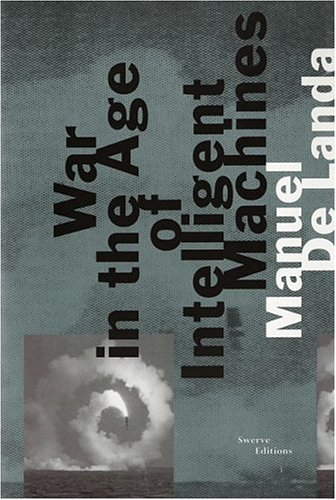Manuel DeLanda: War in the Age of Intelligent Machines (1991)
Filed under book | Tags: · abstract machine, arpanet, artificial intelligence, expert systems, machine, military, robots, technology, turing machine, war

“In the aftermath of the methodical destruction of Iraq during the Persian Gulf War, the power and efficiency of new computerized weapons and surveillance technology have become chillingly apparent. For Manuel De Landa, however, this new weaponry has a significance that goes far beyond military applications: he shows how it represents a profound historical shift in the relation of human beings both to machines and to information. The recent emergence of “intelligent” and autonomous bombs and missiles equipped with artificial perception and decision-making capabilities is, for De Landa, part of a much larger transfer of cognitive structures from humans to machines in the late twentieth century.
In this remarkable book, De Landa provides a rich panorama of these astonishing developments. He details the mutating history of information analysis and machinic organization from the mobile siege artillery of the Renaissance, the clockwork armies of the Thirty Years War, the Napoleonic campaigns, and the Nazi blitzkrieg up to present-day cybernetic battle-management systems and satellite reconnaissance networks. Much more than a history of warfare, De Landa provides an unprecedented philosophical and historical reflection on the changing forms through which human bodies and materials are combined, organized, deployed, and made effective.”
Publisher Zone Books, 1991
ISBN 0942299752
271 pages
PDF (15 MB, updated on 2016-7-18)
Comment (0)Manuel De Landa: A Thousand Years of Nonlinear History (1997)
Filed under book | Tags: · abstract machine, economy, history, linguistics, meshwork, non-linear history, philosophy, self-organization

“Following in the wake of his groundbreaking work War in the Age of Intelligent Machines, Manuel De Landa presents a radical synthesis of historical development of the last thousand years. A Thousand Years of Nonlinear History sketches the outlines of a renewed materialist philosophy of history in the tradition of Fernand Braudel, Gilles Deleuze, and Félix Guattari, while engaging the critical new understanding of material processes derived from the sciences of dynamics. Working against prevailing attitudes that see history merely as the arena of texts, discourses, ideologies, and metaphors, De Landa traces the concrete movements and interplays of matter and energy through human populations in the last millennium. The result is an entirely novel approach to the study of human societies and their always mobile, semi-stable forms, cities, economies, technologies, and languages.
De Landa attacks three domains that have given shape to human societies: economics, biology, and linguistics. In each case, De Landa discloses the self-directed processes of matter and energy interacting with the whim and will of human history itself to form a panoramic vision of the West free of rigid teleology and naive notions of progress and, even more important, free of any deterministic source for its urban, institutional, and technological forms. The source of all concrete forms in the West’s history, rather, is shown to derive from internal morphogenetic capabilities that lie within the flow of matter-energy itself.”
Publisher Zone Books, 1997
Swerve Editions, New York, 2000
ISBN 0942299329
333 pages
PDF (4 MB, updated on 2015-9-1)
Comment (1)Garin Dowd: Abstract Machines: Samuel Beckett and Philosophy after Deleuze and Guattari (2007)
Filed under book | Tags: · abstract machine, immanence, literature, phenomenology, philosophy

Abstract Machines: Samuel Beckett and Philosophy after Deleuze and Guattari is an innovative approach to the relationship of the work of Samuel Beckett to philosophy. The study seeks to combine intertextual analysis and a ‘schizoanalytic genealogy’ derived from the thought of Gilles Deleuze and Flix Guattari to explore a ‘becoming-philosophy’ of Beckett’s literary writing. The author focuses on zones of encounter and confrontation – spaces and times of ‘becoming’ – between Beckett, selected philosophers and Deleuze and Guattari. In the retrospective glance occasioned by that part of Deleuze and Guattari’s complex legacy which embraces their interest in the author, Beckett’s writing in particular effectuates a threshold hesitation which can be seen directly to impact on their approach to the history of philosophy and on their contribution to its ‘molecularization’ in the name of experimentation. “Abstract Machines,” with its arresting perspectives on a wide range of Beckett’s work, will appeal to academics and postgraduate students interested in the philosophical echoes so evident in his writing. The extent of its recourse to philosophers aside from Deleuze and Guattari, including, notably, Alain Badiou, renders it a timely and provocative intervention in contemporary debates concerning the relationship of literature to philosophy, both within Beckett studies and beyond.
Publisher Rodopi, Amsterdam/New York, 2007
ISBN 904202206X, 9789042022065
319 pages
Keywords and phrases
Leibniz, abstract machine, Worstward Ho, plane of immanence, Samuel Beckett, monad, Mille Plateaux, body without organs, Plotinus, Gilles Deleuze, Alain Badiou, deterritorialization, Spinoza, Malone Dies, schizoanalysis, phenomenology, Monadology, negative theology, Mengue, Deleuze and Guattari
PDF (updated on 2013-2-7)
Comments (2)
